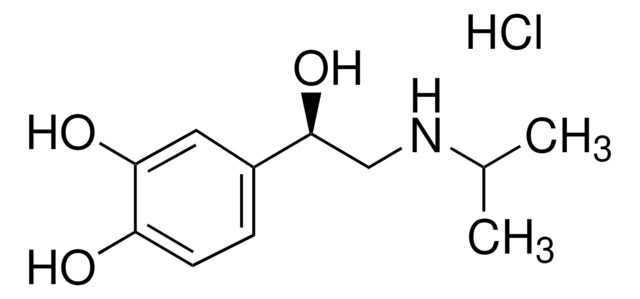P0884
(±)-Propranolol hydrochloride
≥99% (TLC), powder, β-adrenoceptor antagonist
Sinónimos:
(±)-1-Isopropylamino-3-(1-naphthyloxy)-2-propanol hydrochloride, DL-Propranolol hydrochloride
About This Item
Productos recomendados
product name
(±)-Propranolol hydrochloride, ≥99% (TLC), powder
Quality Level
assay
≥99% (TLC)
form
powder
color
white
solubility
ethanol: 10 mg/mL
DMSO: <14.5 mg/mL
H2O: 50 mg/mL
45% (w/v) aq 2-hydroxypropyl-β-cyclodextrin: 8.0 mg/mL
originator
AstraZeneca
storage temp.
2-8°C
SMILES string
Cl.CC(C)NCC(O)COc1cccc2ccccc12
InChI
1S/C16H21NO2.ClH/c1-12(2)17-10-14(18)11-19-16-9-5-7-13-6-3-4-8-15(13)16;/h3-9,12,14,17-18H,10-11H2,1-2H3;1H
InChI key
ZMRUPTIKESYGQW-UHFFFAOYSA-N
Gene Information
human ... ADRB1(153) , ADRB2(154) , ADRB3(155) , HTR1A(3350) , HTR1B(3351) , HTR1D(3352) , HTR1E(3354) , HTR1F(3355) , HTR2A(3356) , HTR2B(3357) , HTR2C(3358)
¿Está buscando productos similares? Visita Guía de comparación de productos
General description
Application
- to determine whether autonomic nervous system mediated the promotive effect on skin microcirculation in rat
- as a non-selective β- receptor blocker to reduce the arrhythmogenic events
- to study its effect on oxygen-induced retinopathy in mice
Biochem/physiol Actions
Features and Benefits
Caution
signalword
Warning
hcodes
Hazard Classifications
Acute Tox. 4 Oral
Storage Class
11 - Combustible Solids
wgk_germany
WGK 3
flash_point_f
Not applicable
flash_point_c
Not applicable
ppe
dust mask type N95 (US), Eyeshields, Faceshields, Gloves
Certificados de análisis (COA)
Busque Certificados de análisis (COA) introduciendo el número de lote del producto. Los números de lote se encuentran en la etiqueta del producto después de las palabras «Lot» o «Batch»
¿Ya tiene este producto?
Encuentre la documentación para los productos que ha comprado recientemente en la Biblioteca de documentos.
Los clientes también vieron
Artículos
DISCOVER Bioactive Small Molecules for Neuroscience
DISCOVER Bioactive Small Molecules for Neuroscience
DISCOVER Bioactive Small Molecules for Neuroscience
DISCOVER Bioactive Small Molecules for Neuroscience
Chromatograms
application for SFCapplication for HPLCapplication for HPLCNuestro equipo de científicos tiene experiencia en todas las áreas de investigación: Ciencias de la vida, Ciencia de los materiales, Síntesis química, Cromatografía, Analítica y muchas otras.
Póngase en contacto con el Servicio técnico











